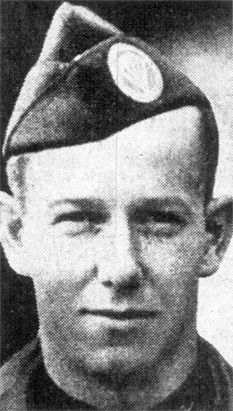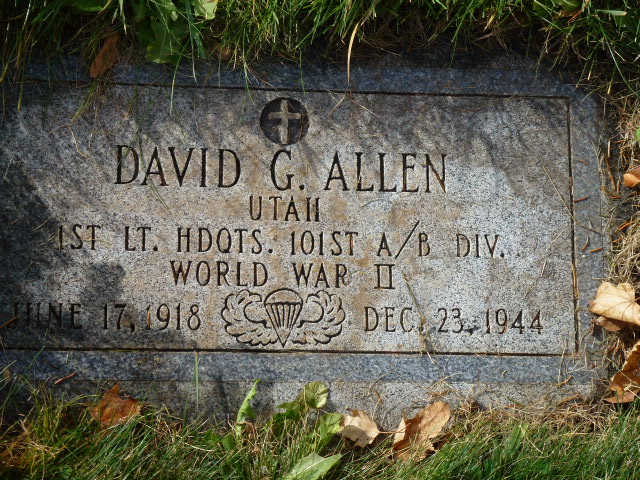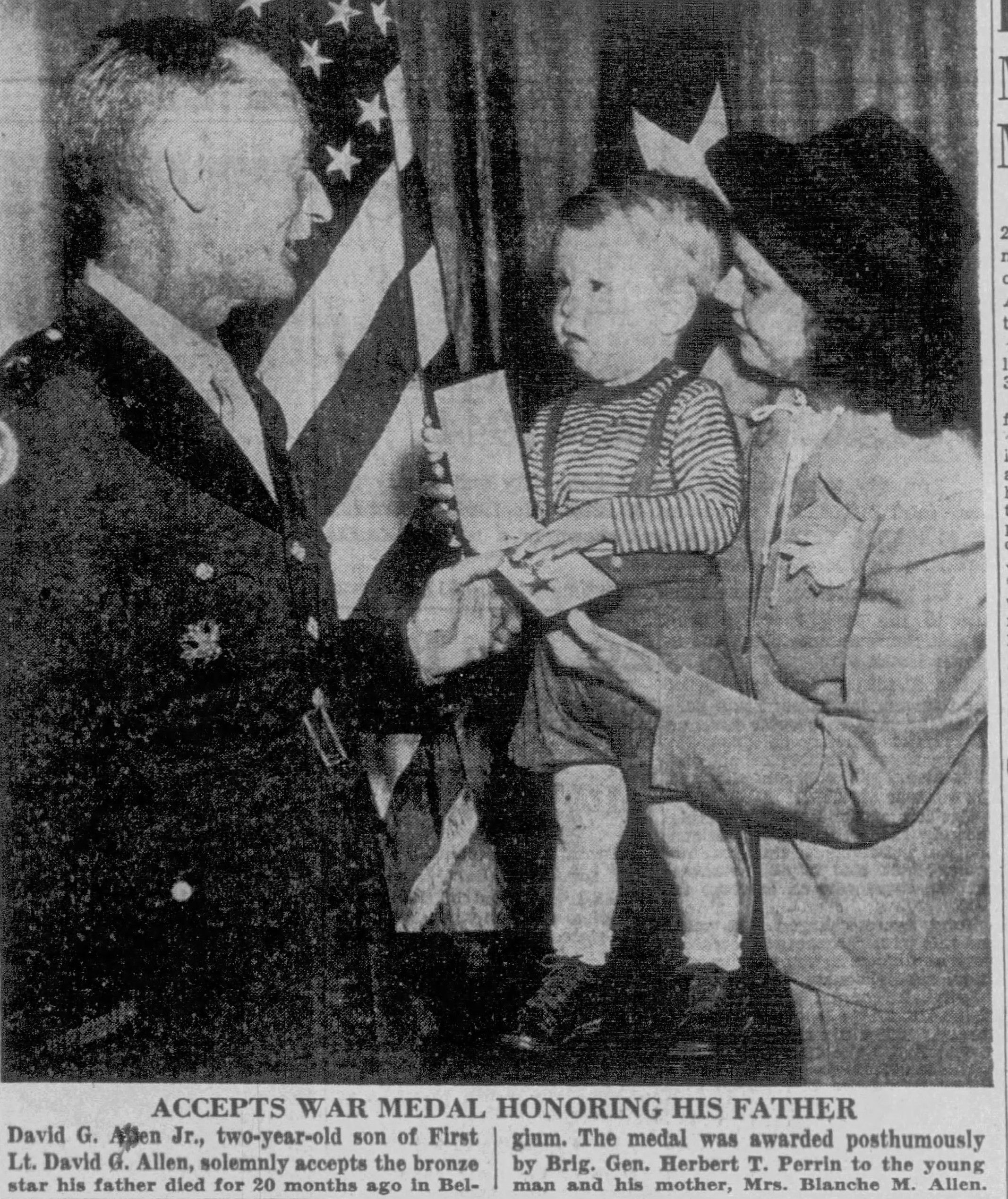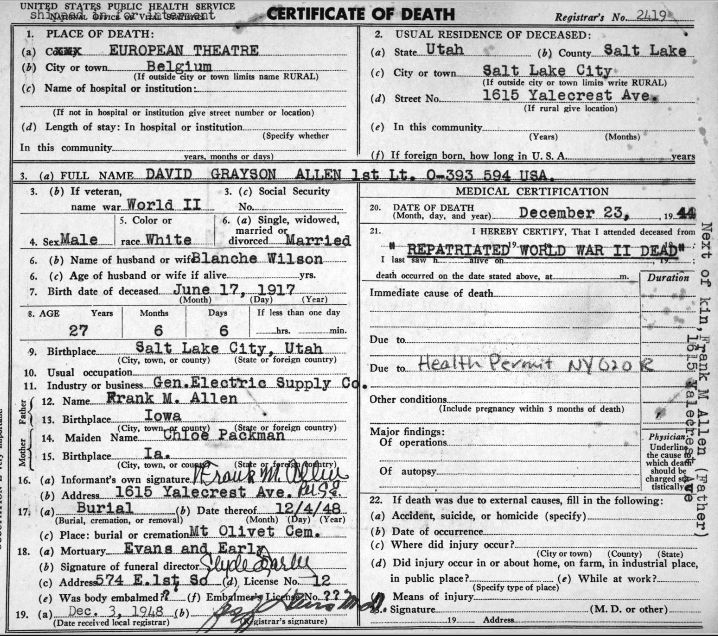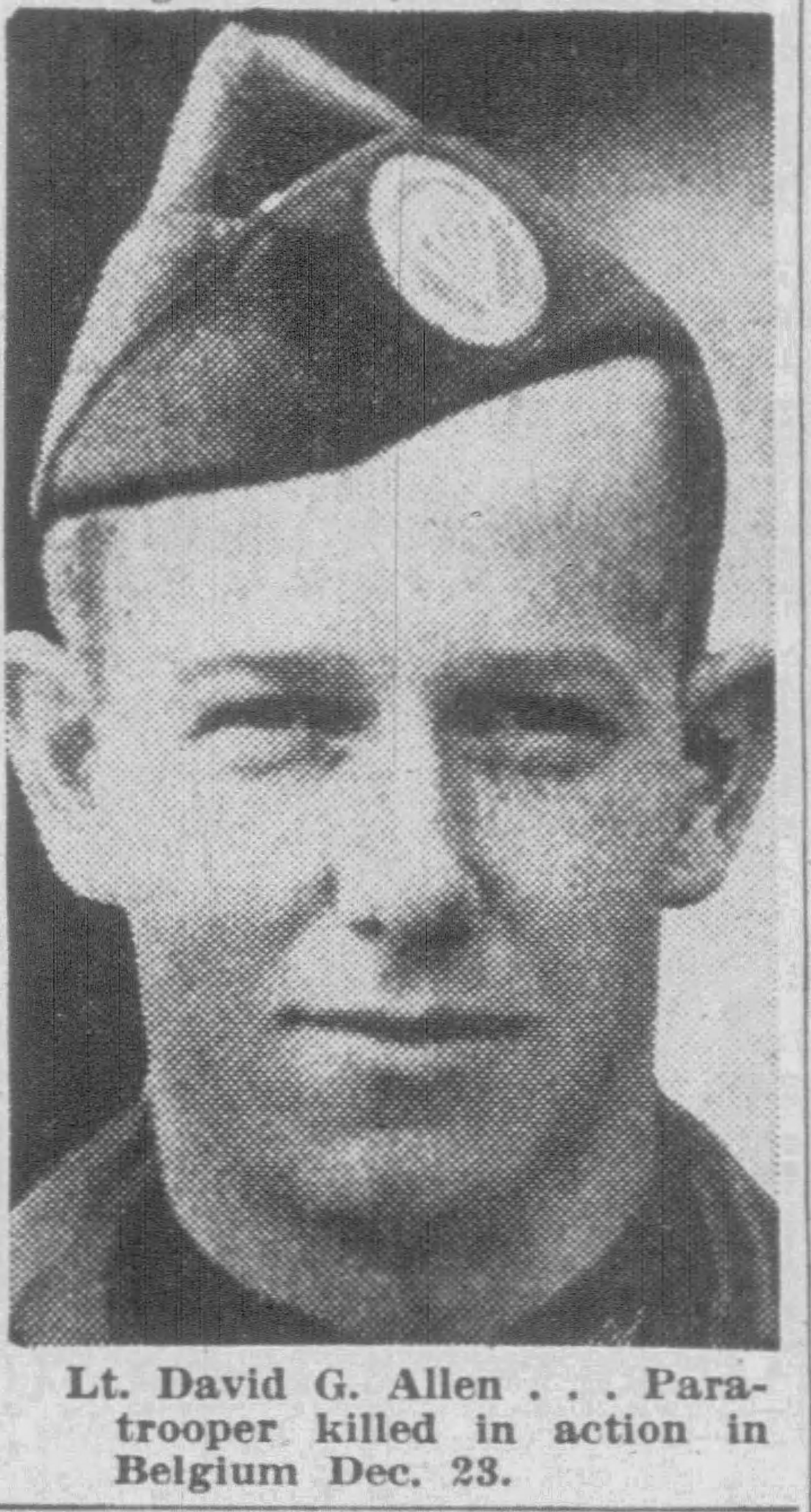Died in Belgium in the European Theater - Repatriated World War II Dead buried at Mount Olivet Cemetery 4 Dec 1948
* * * * * * * *
A Battling Bastard of Bastogne
A Story of:
David Grayson Allen
David Grayson Allen was born on Sunday, June 17th, 1917 (sic) in the shadow of the Wasatch Mountain Range in Salt Lake City, Utah. His father, Frank M. Allen, and his mother, Chloe Packman Allen, were both from Knoxville, Iowa and had come to Utah in 1913. Frank was a self-made man and was able to go from the depths of poverty in Iowa to the owner of the Steel Engineers Company in Salt Lake City.
David Grew up in Salt Lake and attended Uintah school, Roosevelt Jr. High, and East High school. During this time, David met his future wife, Mary Blanche Wilson (Blanche) and worked at the General Electric Supply Company in Salt Lake City. David attended the University of Utah and joined the university’s ROTC program where in the summer of 1936 he won the prestigious “Order of the Rose” award. David had attended the Civilian Military Training Camp (C.M.T.C) at Fort Douglas Utah and had been chosen for the Order of the Rose award due to what the Salt Lake Tribune described as the “most patriotic, soldiery and meritorious trainee at the camp”. The award came with a scholarship to the Mill Military Academy of Portland Oregon. David received his commission as a Second Lieutenant in the United States Army Reserve. Lt. Allen had two brothers also in the service: Army Lt. Robert Allen, assigned at the Ogden Arsenal in Ogden, Utah, and Dr. Richard G. Allen, who served in the Navy. Mr. & Mrs. Frank Allen had a Sons in Service flag with 3 blue stars.
On January 6th, 1941, Second Lieutenant David G. Allen received orders to attended paratroop training at Ft. Benning Georgia and was awarded his Jump Wings. He would be promoted to First Lieutenant within a year’s time. As Lt. Allen was winning his jump wings and getting promoted, the love of his life, Blanche, had taken a job as Utah Congressman Will Robinson's secretary in Washington, D.C., which brought them closer to each other.
Lt. Allen was stationed at Ft. Benning Georgia, where he was part of a group that tested emergency and fighting equipment, including testing Gliders and making 15 jumps into a lake to test a one-man life raft designed for flyers who were downed over water. Sometime in 1942, Lt. Allen joined the ranks of the 101st Airborne Division at Ft. Bragg, North Carolina. The 101st was known as the “Screaming Eagles”, due to the fierce Bald Eagle Emblem that was their shoulder patch. It was while Lt. Allen was at Ft. Bragg that on November 7th, 1942, he married his true love Blanche. The ceremony was officiated by 101st Airborne Division Chaplin Raymond S. Hall.
By the spring of 1943, Lt. Allen and his 101st Division was ready to face its first test in training maneuvers and then onto Tennessee for a major training exercise. The 101st returned to Fort Bragg, continuing to train and perform various airborne demonstrations for visiting officials until mid-August 1943, when it received orders for transfer overseas. Arriving in England, the 101st was quartered in Wiltshire and Berkshire, where it continued to train. During this time, Lt. Allen was informed that his wife Blanche had given birth to his son, David Grayson Allen Jr.
On the night of June 5th, 1944, the 101st made its foray into combat with a parachute jump into Normandy, France that marked the beginning of the D-Day Operation. This was followed on June 6th with glider operations bringing the remaining parts of the 101st into the battle. The 101st was to capture the causeway bridges that ran behind the beach between St. Martin-de-Varreville and Pouppeville. In the division's southern sector, it was to seize the la Barquette lock and destroy a highway bridge northwest of the town of Carentan and a railroad bridge further west. At the same time, elements of the division were to establish two bridgeheads on the Douve River at le Port, northeast of Carentan. There is no available information what part Lt. Allen took in these battles and the 101st returned to England in July 1944 to recover from the decisive engagement.
On September 17th, 1944, Lt. Allen and the 101st Airborne Division spearheaded Operation Market Garden, which was a daring plan to seize key bridges in Holland with allied paratroopers in coordination with allied ground forces. The planes carrying the 101st encountered heavy antiaircraft fire as they approached their targets, but the pilots were able to hold formation. The paratroopers were mostly delivered to the correct drop zones. Lt. Allen parachuted into Holland near the city of Eindhoven. Lt. Allen and the 101st Airborne was greeted by enthusiastic crowds of Dutch citizens, who had finally been freed from the Nazis.
Lt. Allen and the 101st fought several battles in and around the key bridges of the small villages. The German Army, including hated SS units, counter-attacked all along the way. From the Market-Garden drop until it was sent back to France for a rest and resupply, Lt. Allen and the 101st Division had spent nearly two months in the combat zones. The 101st Division suffered more than 2,000 casualties in Operation Market Garden in Holland.
As Lt. Allen was fighting in Holland, an article in the November 7th Salt Lake Telegram was written and has a photo of Lt. Allen’s wife, Blanche, his son, David Jr., and Lt. Allen’s Mother Chloe. The story describes how they are getting ready for the election and how they are introducing David Jr. to the election spirit at the tender age of two. It was an election that would see President Franklin D. Roosevelt elected for an unprecedented fourth term.
Lt. Allen and the 101st Division moved from the battle fields of Holland to Mourmelon, France for resupply and a well-deserved rest. As the 101st refitted, the troops took passes to Paris and organized a football team in preparation for a big game against the rival 82nd Airborne Division. That was not to come to pass, as Lt. Allen and the 101st were to be dramatically affected by events that happened in Belgium.
On December 16th, 1944, a large German force attacked through the thin American line in the Arden Forest in Belgium. German forces had punched through stubborn American forces, most of whom had only recently arrived from the United States. The only reserves that General Eisenhower had to help stem the tide of the German forces, were the 82nd and 101st Airborne Divisions. Lt. Allen and the 101st were alerted for movement and on December 18th, 1944, after a long and cold journey, they arrived in Bastogne, Belgium by truck and jeep. A confusing situation confronted Lt. Allen, with troops from the overrun divisions clogging the roads and retreating. Some did this in an orderly fashion while others ran from the German Army in panic. Lt. Allen and the other 101st paratroopers gladly accepted some needed supplies, ammunition, and weapons from the retreating troops. The members of the 101st were alerted and moved to Bastogne so quickly that there was no time to get the needed supplies. The 101st made Bastogne its headquarters and sent its assigned regiments to the small towns a few miles around Bastogne to try to form a secure line and stop the German advance.
On December 22nd, 1944, a German delegation approached the American line around Bastogne under a flag of truce to offer terms of surrender to the acting commander of the 101st Airborne, Brigadier General Anthony McAuliffe. When Gen. McAuliffe learned of the German offer for him to surrender his command, McAuliffe's now famous response "NUTS!" provided a boost to the sagging morale of the Americans. Lt. Allen could have been witness to this. The following day on the 23rd, the weather cleared, and American airdrops of badly needed supplies began around the now surrounded city of Bastogne.
The Germans, who were incensed about Gen McAuliffe’s “Nuts” response, shelled Bastogne relentlessly. Many men took risdks in attempting to secure the supplies recently dropped. Others took the risks in just moving from one building to another, with the fear of being caught in the open when the artillery struck. Fear, cold and bravery permeated the City of Bastogne. It was under these conditions that on Saturday December 23rd, 1944, under the cold clear Belgian skies above Bastogne, First Lieutenant David Grayson Allen was killed in action, after being struck by shrapnel from a German artillery shell. He was 27 years old.
In Salt Lake City, Utah, Blanche Allen and her son, David G. Allen Jr., received a Western Union Telegram at their home, notifying them that their husband and father, had given his life for his country. Lt. Allen’s mother, Chloe Allen, would change her Sons in Service Flag to 2 blue stars and 1 gold star. Lt. Allen was not the only one to sacrifice for his country.
On October 14th, 1945, a ceremony was held at Fort Douglas, Utah, where the Bronze Star was presented to the surviving family of Lt. Allen, his widow Blanche, and his son, David Jr. It was written in an article in the Deseret News about the ceremony that stated, “Poignancy was injected into the ceremony when Mrs. Balance M. Allen, of Salt Lake City, stepped forward to receive the Bronze Star awarded to her husband, 1st Lt. David G. Allen, who was killed in Belgium. Cuddled in her arms was the couple’s son, two-year-old David G. Allen Jr, as the fort’s commanding general reached forward to pin the decoration upon her coat, she silently indicated that it be presented to the son. Gen. Perrin’s hand momentarily hesitated, and as the medal was being pinned on David’s coat, Mrs. Allen slightly smiled as a light film of tears clouded her eyes. Following the ceremony, she said, “that would have been my husband’s wish.”
Lt. David G. Allen was interned in Belgium until 1948, when he was returned to Utah. On Saturday December 5th, 1948, First Lieutenant David Grayson Allen was laid to rest, under the shadow of the Wasatch Mountains, in the Mt. Olivet Cemetery in Salt Lake City. Rest in peace soldier, we are grateful for your service and sacrifice.
Story by Troy Burnett July 2020
Contributor: G.T. Burnett (49081683)
Died in Belgium in the European Theater - Repatriated World War II Dead buried at Mount Olivet Cemetery 4 Dec 1948
* * * * * * * *
A Battling Bastard of Bastogne
A Story of:
David Grayson Allen
David Grayson Allen was born on Sunday, June 17th, 1917 (sic) in the shadow of the Wasatch Mountain Range in Salt Lake City, Utah. His father, Frank M. Allen, and his mother, Chloe Packman Allen, were both from Knoxville, Iowa and had come to Utah in 1913. Frank was a self-made man and was able to go from the depths of poverty in Iowa to the owner of the Steel Engineers Company in Salt Lake City.
David Grew up in Salt Lake and attended Uintah school, Roosevelt Jr. High, and East High school. During this time, David met his future wife, Mary Blanche Wilson (Blanche) and worked at the General Electric Supply Company in Salt Lake City. David attended the University of Utah and joined the university’s ROTC program where in the summer of 1936 he won the prestigious “Order of the Rose” award. David had attended the Civilian Military Training Camp (C.M.T.C) at Fort Douglas Utah and had been chosen for the Order of the Rose award due to what the Salt Lake Tribune described as the “most patriotic, soldiery and meritorious trainee at the camp”. The award came with a scholarship to the Mill Military Academy of Portland Oregon. David received his commission as a Second Lieutenant in the United States Army Reserve. Lt. Allen had two brothers also in the service: Army Lt. Robert Allen, assigned at the Ogden Arsenal in Ogden, Utah, and Dr. Richard G. Allen, who served in the Navy. Mr. & Mrs. Frank Allen had a Sons in Service flag with 3 blue stars.
On January 6th, 1941, Second Lieutenant David G. Allen received orders to attended paratroop training at Ft. Benning Georgia and was awarded his Jump Wings. He would be promoted to First Lieutenant within a year’s time. As Lt. Allen was winning his jump wings and getting promoted, the love of his life, Blanche, had taken a job as Utah Congressman Will Robinson's secretary in Washington, D.C., which brought them closer to each other.
Lt. Allen was stationed at Ft. Benning Georgia, where he was part of a group that tested emergency and fighting equipment, including testing Gliders and making 15 jumps into a lake to test a one-man life raft designed for flyers who were downed over water. Sometime in 1942, Lt. Allen joined the ranks of the 101st Airborne Division at Ft. Bragg, North Carolina. The 101st was known as the “Screaming Eagles”, due to the fierce Bald Eagle Emblem that was their shoulder patch. It was while Lt. Allen was at Ft. Bragg that on November 7th, 1942, he married his true love Blanche. The ceremony was officiated by 101st Airborne Division Chaplin Raymond S. Hall.
By the spring of 1943, Lt. Allen and his 101st Division was ready to face its first test in training maneuvers and then onto Tennessee for a major training exercise. The 101st returned to Fort Bragg, continuing to train and perform various airborne demonstrations for visiting officials until mid-August 1943, when it received orders for transfer overseas. Arriving in England, the 101st was quartered in Wiltshire and Berkshire, where it continued to train. During this time, Lt. Allen was informed that his wife Blanche had given birth to his son, David Grayson Allen Jr.
On the night of June 5th, 1944, the 101st made its foray into combat with a parachute jump into Normandy, France that marked the beginning of the D-Day Operation. This was followed on June 6th with glider operations bringing the remaining parts of the 101st into the battle. The 101st was to capture the causeway bridges that ran behind the beach between St. Martin-de-Varreville and Pouppeville. In the division's southern sector, it was to seize the la Barquette lock and destroy a highway bridge northwest of the town of Carentan and a railroad bridge further west. At the same time, elements of the division were to establish two bridgeheads on the Douve River at le Port, northeast of Carentan. There is no available information what part Lt. Allen took in these battles and the 101st returned to England in July 1944 to recover from the decisive engagement.
On September 17th, 1944, Lt. Allen and the 101st Airborne Division spearheaded Operation Market Garden, which was a daring plan to seize key bridges in Holland with allied paratroopers in coordination with allied ground forces. The planes carrying the 101st encountered heavy antiaircraft fire as they approached their targets, but the pilots were able to hold formation. The paratroopers were mostly delivered to the correct drop zones. Lt. Allen parachuted into Holland near the city of Eindhoven. Lt. Allen and the 101st Airborne was greeted by enthusiastic crowds of Dutch citizens, who had finally been freed from the Nazis.
Lt. Allen and the 101st fought several battles in and around the key bridges of the small villages. The German Army, including hated SS units, counter-attacked all along the way. From the Market-Garden drop until it was sent back to France for a rest and resupply, Lt. Allen and the 101st Division had spent nearly two months in the combat zones. The 101st Division suffered more than 2,000 casualties in Operation Market Garden in Holland.
As Lt. Allen was fighting in Holland, an article in the November 7th Salt Lake Telegram was written and has a photo of Lt. Allen’s wife, Blanche, his son, David Jr., and Lt. Allen’s Mother Chloe. The story describes how they are getting ready for the election and how they are introducing David Jr. to the election spirit at the tender age of two. It was an election that would see President Franklin D. Roosevelt elected for an unprecedented fourth term.
Lt. Allen and the 101st Division moved from the battle fields of Holland to Mourmelon, France for resupply and a well-deserved rest. As the 101st refitted, the troops took passes to Paris and organized a football team in preparation for a big game against the rival 82nd Airborne Division. That was not to come to pass, as Lt. Allen and the 101st were to be dramatically affected by events that happened in Belgium.
On December 16th, 1944, a large German force attacked through the thin American line in the Arden Forest in Belgium. German forces had punched through stubborn American forces, most of whom had only recently arrived from the United States. The only reserves that General Eisenhower had to help stem the tide of the German forces, were the 82nd and 101st Airborne Divisions. Lt. Allen and the 101st were alerted for movement and on December 18th, 1944, after a long and cold journey, they arrived in Bastogne, Belgium by truck and jeep. A confusing situation confronted Lt. Allen, with troops from the overrun divisions clogging the roads and retreating. Some did this in an orderly fashion while others ran from the German Army in panic. Lt. Allen and the other 101st paratroopers gladly accepted some needed supplies, ammunition, and weapons from the retreating troops. The members of the 101st were alerted and moved to Bastogne so quickly that there was no time to get the needed supplies. The 101st made Bastogne its headquarters and sent its assigned regiments to the small towns a few miles around Bastogne to try to form a secure line and stop the German advance.
On December 22nd, 1944, a German delegation approached the American line around Bastogne under a flag of truce to offer terms of surrender to the acting commander of the 101st Airborne, Brigadier General Anthony McAuliffe. When Gen. McAuliffe learned of the German offer for him to surrender his command, McAuliffe's now famous response "NUTS!" provided a boost to the sagging morale of the Americans. Lt. Allen could have been witness to this. The following day on the 23rd, the weather cleared, and American airdrops of badly needed supplies began around the now surrounded city of Bastogne.
The Germans, who were incensed about Gen McAuliffe’s “Nuts” response, shelled Bastogne relentlessly. Many men took risdks in attempting to secure the supplies recently dropped. Others took the risks in just moving from one building to another, with the fear of being caught in the open when the artillery struck. Fear, cold and bravery permeated the City of Bastogne. It was under these conditions that on Saturday December 23rd, 1944, under the cold clear Belgian skies above Bastogne, First Lieutenant David Grayson Allen was killed in action, after being struck by shrapnel from a German artillery shell. He was 27 years old.
In Salt Lake City, Utah, Blanche Allen and her son, David G. Allen Jr., received a Western Union Telegram at their home, notifying them that their husband and father, had given his life for his country. Lt. Allen’s mother, Chloe Allen, would change her Sons in Service Flag to 2 blue stars and 1 gold star. Lt. Allen was not the only one to sacrifice for his country.
On October 14th, 1945, a ceremony was held at Fort Douglas, Utah, where the Bronze Star was presented to the surviving family of Lt. Allen, his widow Blanche, and his son, David Jr. It was written in an article in the Deseret News about the ceremony that stated, “Poignancy was injected into the ceremony when Mrs. Balance M. Allen, of Salt Lake City, stepped forward to receive the Bronze Star awarded to her husband, 1st Lt. David G. Allen, who was killed in Belgium. Cuddled in her arms was the couple’s son, two-year-old David G. Allen Jr, as the fort’s commanding general reached forward to pin the decoration upon her coat, she silently indicated that it be presented to the son. Gen. Perrin’s hand momentarily hesitated, and as the medal was being pinned on David’s coat, Mrs. Allen slightly smiled as a light film of tears clouded her eyes. Following the ceremony, she said, “that would have been my husband’s wish.”
Lt. David G. Allen was interned in Belgium until 1948, when he was returned to Utah. On Saturday December 5th, 1948, First Lieutenant David Grayson Allen was laid to rest, under the shadow of the Wasatch Mountains, in the Mt. Olivet Cemetery in Salt Lake City. Rest in peace soldier, we are grateful for your service and sacrifice.
Story by Troy Burnett July 2020
Contributor: G.T. Burnett (49081683)
Inscription
UTAH
1ST LT. HDQTS. 101ST A/B DIV.
WORLD WAR II
Family Members
Other Records
Sponsored by Ancestry
Advertisement
Explore more
Sponsored by Ancestry
Advertisement
